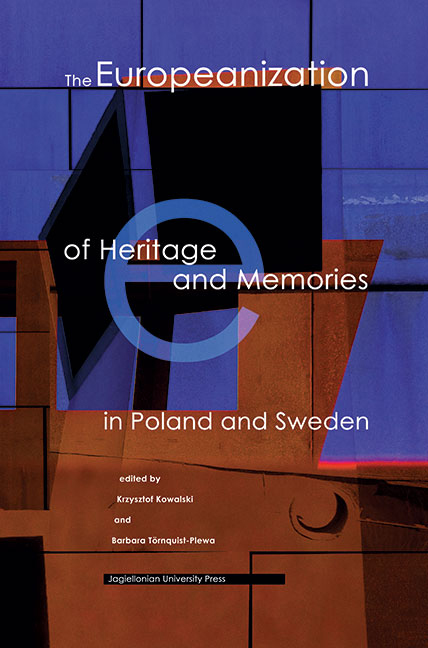Book contents
- Frontmatter
- Contents
- Acknowledgements
- Preface
- PART I European Heritage in the Making
- PART II Redefining the Dramatic Past
- The Europeanization of the Memory and Heritage of the Second World War and the Holocaust in Sweden
- The White Buses. Creating Remembrance of the Second World War in Sweden
- Remembering and Forgetting the Holocaust. The Cases of Jan Karski and Raoul Wallenberg
- The Rise of the Righteous Among the Nations as a New Model for the Polish Hero
- Europeanization at the Memorial Sites of Former Nazi Concentration Camps in Poland. The Cases of Auschwitz, Majdanek and Kulmhof
- Conclusion
- Notes on Contributors
The Rise of the Righteous Among the Nations as a New Model for the Polish Hero
from PART II - Redefining the Dramatic Past
Published online by Cambridge University Press: 22 December 2017
- Frontmatter
- Contents
- Acknowledgements
- Preface
- PART I European Heritage in the Making
- PART II Redefining the Dramatic Past
- The Europeanization of the Memory and Heritage of the Second World War and the Holocaust in Sweden
- The White Buses. Creating Remembrance of the Second World War in Sweden
- Remembering and Forgetting the Holocaust. The Cases of Jan Karski and Raoul Wallenberg
- The Rise of the Righteous Among the Nations as a New Model for the Polish Hero
- Europeanization at the Memorial Sites of Former Nazi Concentration Camps in Poland. The Cases of Auschwitz, Majdanek and Kulmhof
- Conclusion
- Notes on Contributors
Summary
Contemporary Europe is currently facing an identity crisis. The member states of the European Union are performing a balancing act between their national identity and attempts to create a common European identity based on values such as respect for human life, human dignity and human rights in general. In these circumstances, certain countries are developing new types of collective memories. This chapter will focus on its specific form − the hero model − and how it is undergoing significant changes in Poland.
Hero figures are important elements of collective memory. They impart positive behavioral patterns and deliver a desirable role model for the members of a society. In Polish collective memory, the pattern of the heroic soldier sacrificing his life for the fatherland, created in the era of Romanticism, was substantially re-examined and changed after the experiences of the Second World War. The process of developing a new desirable role model after 1945 took place during times of the profound transformation of the significance of Jews and Jewish issues in Polish collective memory and public discourse and in opposition to the Israeli narrative of the Righteous Among the Nations.
Under Communism, Jewish issues were completely ignored or suppressed by the government. Similarly, the issue of the Righteous was treated instrumentally by the Communist government and it is only since the 1980s that the situation has begun to change. The coming to terms with the Holocaust in Poland came together with the more general tendency to focus on Holocaust remembrance in Europe during the late 20th century. It seems to be clear that there was a solid link between coming to terms with the Holocaust and accession to the EU by Poland in 2004.
During 2010−14, the Polish History Museum in Warsaw implemented the program “Jan Karski. Unfinished Mission” with the aim “to restore the memory of his achievements to the Polish consciousness and to re-establish his persona in the pantheon of Polish heroes.”
In the following chapter, the developing public memory of Jan Karski will be analyzed as an example of an emerging new hero pattern. Against the backdrop of Karski's life and legacy it will be discussed how he, as one of the most well-known of the Righteous Among the Nations, has become a national hero in Poland and even, to some degree, a European hero figure.
- Type
- Chapter
- Information
- Publisher: Jagiellonian University PressPrint publication year: 2016



